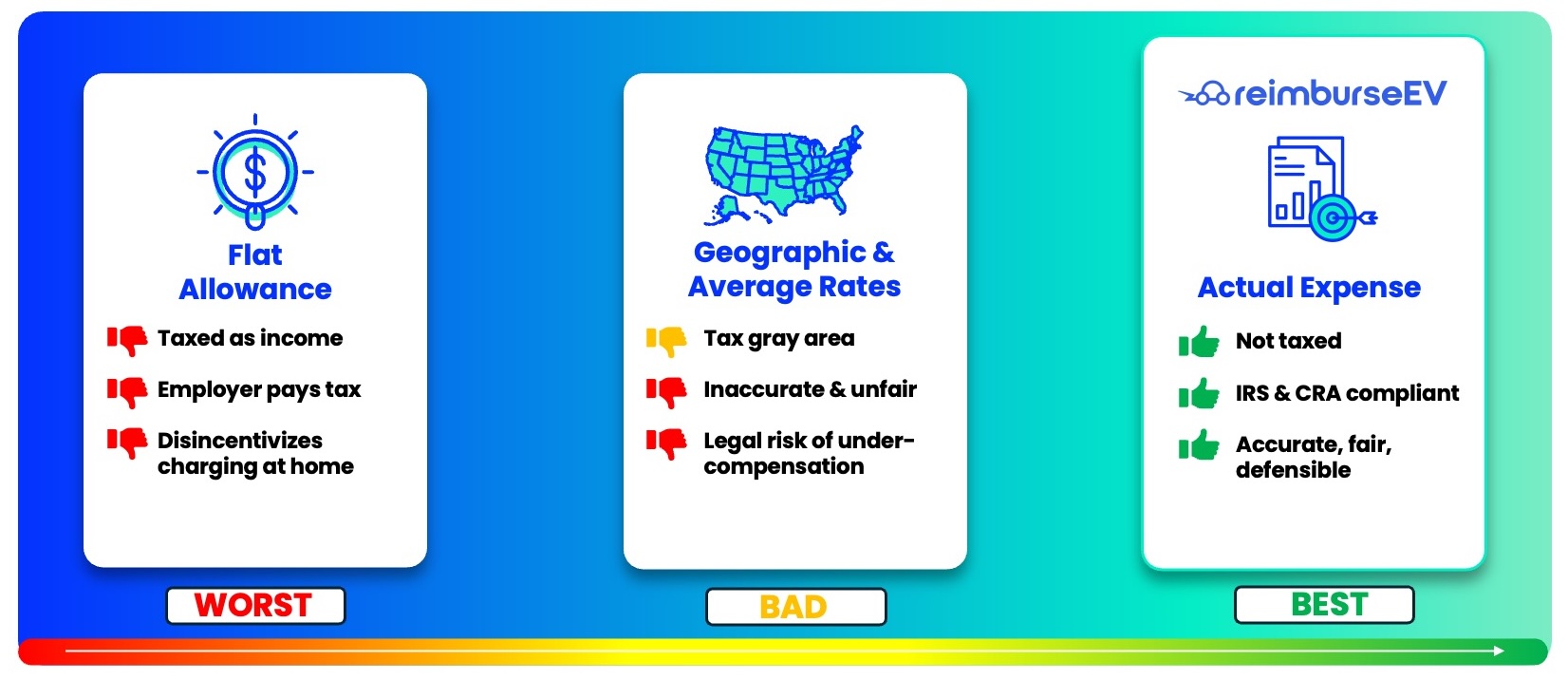Home EV Charging Reimbursement: A New Frontier for Employers in North America
Guest post by Kate L. Harrison, Co-Founder and Head of Marketing, MoveEV
Nov 25, 2024

As the number of electric vehicles (EVs) in a fleet grows, Fleet Managers can slash fuel costs up to 60 percent by leveraging off-peak residential electricity rates. However, a shift toward using employees' homes as charging stations introduces a new challenge: devising a fair and accurate method to reimburse employees for their home electricity costs.
The Problem with Stipends
For smaller companies or those just beginning to integrate a few electric vehicles, offering a monthly electricity stipend might seem straightforward. However, this method is flawed for two reasons.
First, such allowances are taxed as income, meaning a significant portion of each payment is lost to taxes (this can be 25% or more in the USA and Canada). For instance, a $100 USD stipend costs the company $107.50, and the employee receives only about $70. As you can see, this quickly diminishes the program's savings.
Second, since stipends are not directly linked to actual home charging, they offer little incentive for employees to plug in at home, potentially leading them to rely on more costly public or on-site depot charging. A policy that promotes a home-first approach and transparent reimbursements based on actual usage is far more cost effective and fair to your drivers.
Expense Calculation Challenge: Tracking Kilowatt-hour (kWh) Use
Calculating accurate EV charging reimbursements is complex due to the difficulty in tracking and verifying electricity usage that is dedicated solely to charging the fleet vehicle. Unlike fuel cards or public charging stations where costs are transparent, home charging muddles personal and work-related expenses.
Some companies turn to dedicated "smart chargers" to differentiate vehicle charging, but these devices are prone to misuse (as they can be used by non-work vehicles) and may increase liability risks if owned and maintained by the company. As a solution, the Geotab GO device logs all EV charging events and the total kWhs charged per session, allowing administrators to accurately track the electricity used for each fleet vehicle, regardless of the charger type, without risk of fraud. This is the kWh tracking method recommended by the US Department of Energy.
Expense Calculation Challenge: Determining Accurate Costs Per Kilowatt-hour (kWh)
The cost per kWh can vary significantly depending on the employee’s home utility plan. For example, with tiered pricing plans, the cost of electricity is based on consumption levels over the billing period. With time-of-use plans, the cost per kWh can change several times a day, with as much as a $.30/kWh spread between on-peak and off-peak rates. Additional considerations include taxes, fees, and net metering.
Given these complexities, it's tempting for fleet managers to use regional rates or averages. However, as outlined in the "Fleet Managers’ Guide to Common and Costly Home Charging Calculation Errors," such practices can result in significant inaccuracies. Any over- or under-payment can also lead to employee dissatisfaction and open your company up to liability (e.g., in California, under CA 2802 failure to properly reimburse an employee can result in a costly class action lawsuit — a prospect no company wants to deal with).

The Solution: Geotab Integrated Software
For these reasons, calculating accurate reimbursements for EV home charging can be labor-intensive, often requiring up to an hour per employee each month if done manually. Advanced software, like ReimburseEV, a solution by MoveEV, is essential not only for reducing the administrative burden but also for ensuring accuracy and creating an auditable and transparent record for the future.
About MoveEV
MoveEV®, a member of the Geotab Sustainability Alliance, is an AI-powered EV transition company that helps organizations convert fleet and employee-owned gas vehicles to electric and reimburse for charging at home. ReimburseEV™, allows companies to accurately reimburse employees for the real costs of charging their fleet vehicles at home. As a Geotab Marketplace partner, you can learn more about this solution on the Geotab Marketplace.
Kate L. Harrison is the Co-Founder and Head of Marketing at MoveEV, an AI-powered EV transition company that helps organizations accelerate electric vehicle adoption by accurately reimbursing for charging at home. With more than a decade of experience as a serial entrepreneur and seasoned marketer, Kate has worked with small businesses, nonprofits, and government organizations to make the world a better place. She is a best-selling author, thought leader, and frequent speaker at conferences and events, sharing her insights and experiences with others who are working to create a more sustainable future.
Subscribe to get industry tips and insights
The Strategic Communications Team write about updates for Geotab.
Table of Contents
Subscribe to get industry tips and insights
Related posts

Run on Less data redefines electric truck viability
December 17, 2025
4 minute read
.png)
From the North Pole to the Highway: How AI and Predictive Insights Get Drivers Home for the Holidays
December 16, 2025
2 minute read


Elevating Worker Safety Through Simplicity: The OK Alone Story
December 3, 2025
2 minute read

The $4B Crisis: Video Intelligence as the Answer to Fleet Distraction
December 2, 2025
3 minute read

The True Cost of Cargo Theft: When Customer Trust is on the Line
November 24, 2025
2 minute read